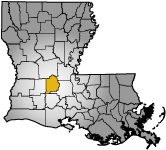SECTION: 800 COMMUNICATIONS
SECTION: 800
TITLE: COMMUNICATIONS
EFFECTIVE DATE: February 15, 2017
PURPOSE
This policy establishes the organization, functions, responsibilities, rules and regulations for deputies of the Evangeline Parish Sheriff's Communications Division.
- Operations
All radio operations will be conducted in accordance with Federal Communications Commission procedures and requirements.
- Interoperability between jurisdictions may be achieved by:
- Use of the system-wide mutual talk-group that will be included in the programming of every mobile and portable radio
- Use of a console patch that may be requested by any field unit at any time, or
- Dynamic regrouping that may be requested by personnel in charge of a major incident involving several jurisdictions
9.02 Communications Operational Guidelines
In order to ensure quality communications services for the citizens of Evangeline Parish and field personnel, the Communications Center will operate under the following guidelines. The Communications Team Commander will develop and maintain a Standard Operating Procedure (SOP) to supplement these general guidelines.
Telecommunicator General Responsibilities
- Primary Responsibilities
The following primary responsibilities will take priority over other duties and responsibilities during normal operations. Under extreme circumstances, primary responsibilities may be prioritized as necessary.
- Receive, properly document, and process all calls for service or assistance in a civil and courteous manner
- Process requests from public safety field units as necessary, and requests from other field units that may need assistance during hours of monitoring
- Keep public safety radio talk groups clear of distractions and control interference that may prevent or adversely affect transmissions
- Receive, properly document and process all medical calls using the proper Emergency Medical Dispatch (EMD) protocols and procedures in accordance with Medical Priority Dispatch Systems
- Secondary Responsibilities
The following secondary responsibilities are necessary during normal operations, but may be deferred or prioritized under extreme circumstances.
- Receive, properly document, and process administrative calls and request both during and after business hours
- Perform other duties as required to provide assistance to Allen Parish Citizens and/or APSO personnel
- Confidentiality
Communications Deputies will maintain confidentiality of information according to the following guidelines:
- All record information obtained through the Criminal Information Computer Network (applicable state system, NLETS and NCIC), is confidential and may only be released to authorized personnel. Vehicle registration is not considered classified record information and may be released on a need-to-know basis to assist persons with a legitimate need to know. However, person other than law enforcement should be referred to the applicable state Division of Motor Vehicles for routine inquiries.
- All information contained within business licensing files is confidential and may be released only to public safety personnel on a need-to-know basis. Communications Deputies will not release any information contained in these types of files to the general public.
- Communications Deputies will not release names of complainants and/or victims to the general public, including the new media.
- Communications Deputies may release the following information pertaining to calls for service: the reported locations and nature of the call, the agency or agencies responding, and the times associated with the call.
- Communications Deputies will refer requests for any other information to the appropriate investigating Deputies or to the Team Commander in charge.
- Communications Deputies will comply with all privacy laws concerning communicable disease information. Information pertaining shall be given to responding personnel to warn of the disease.



